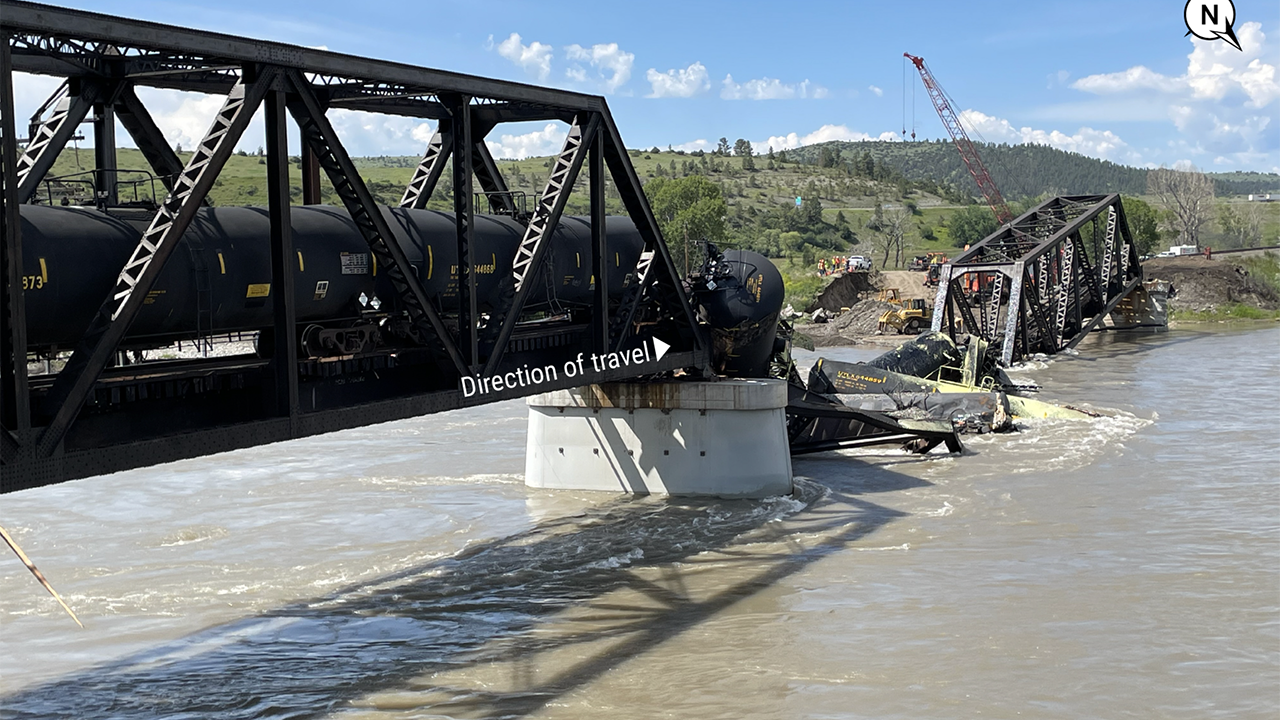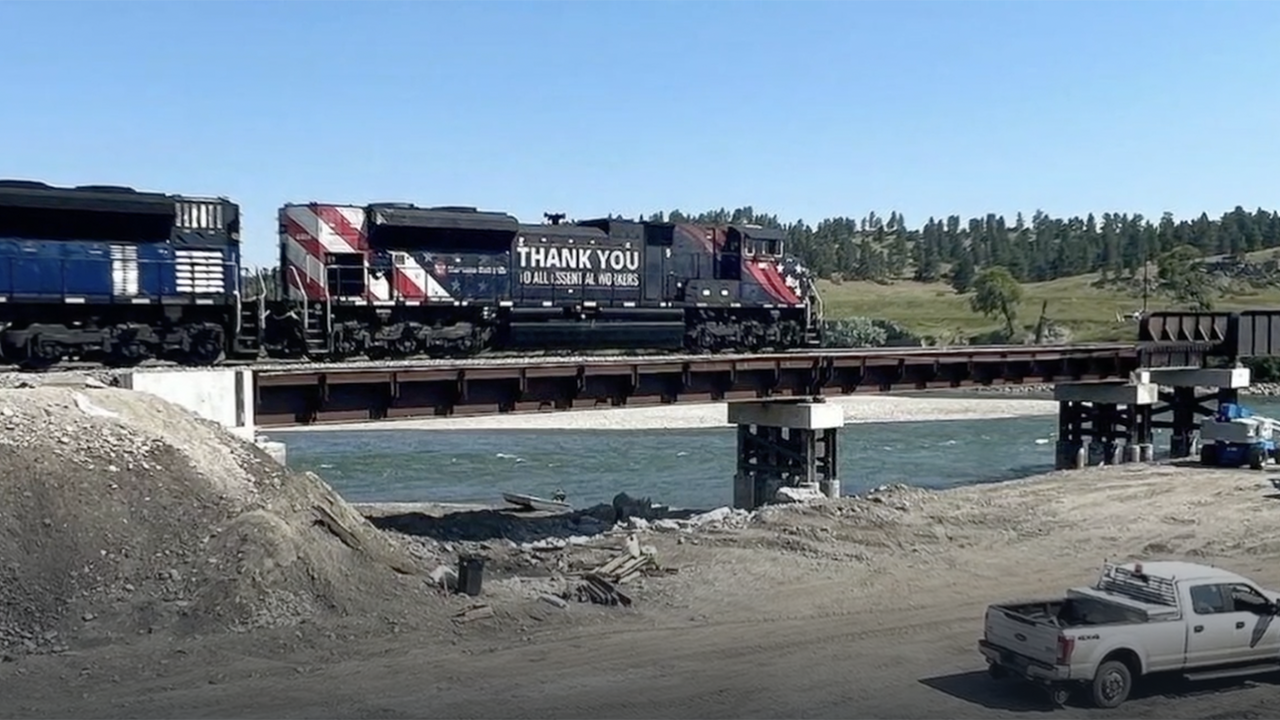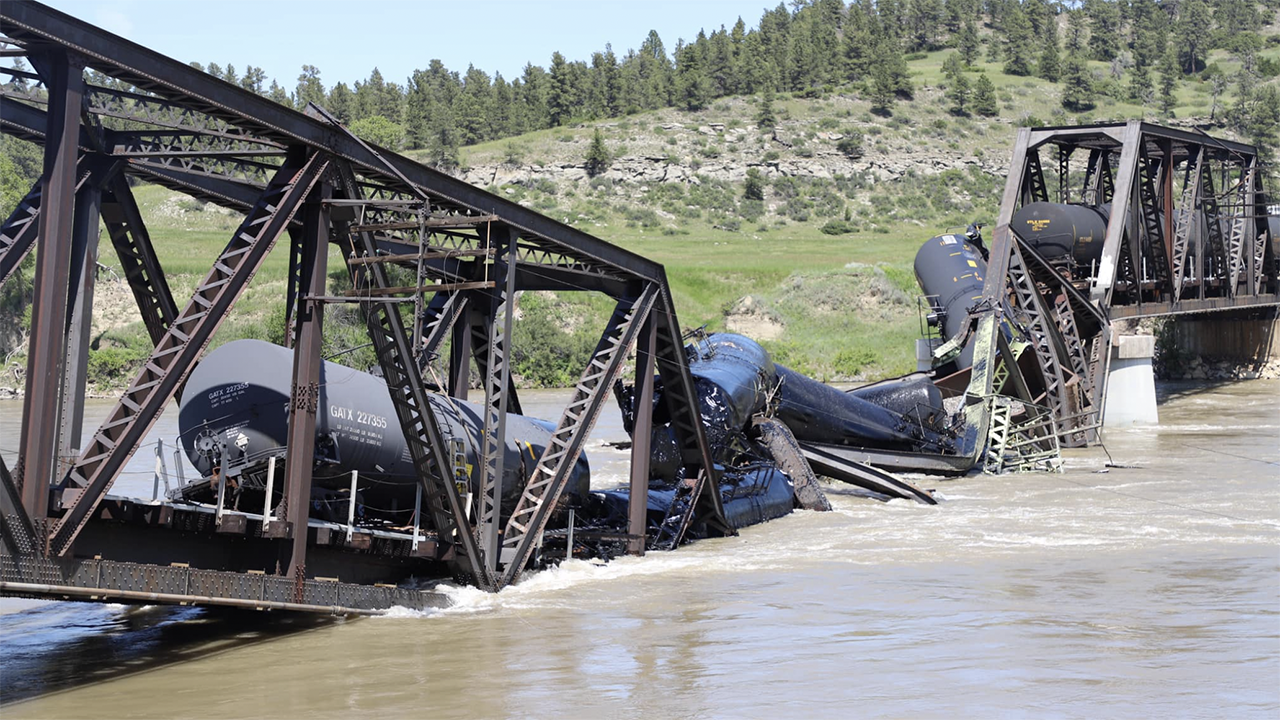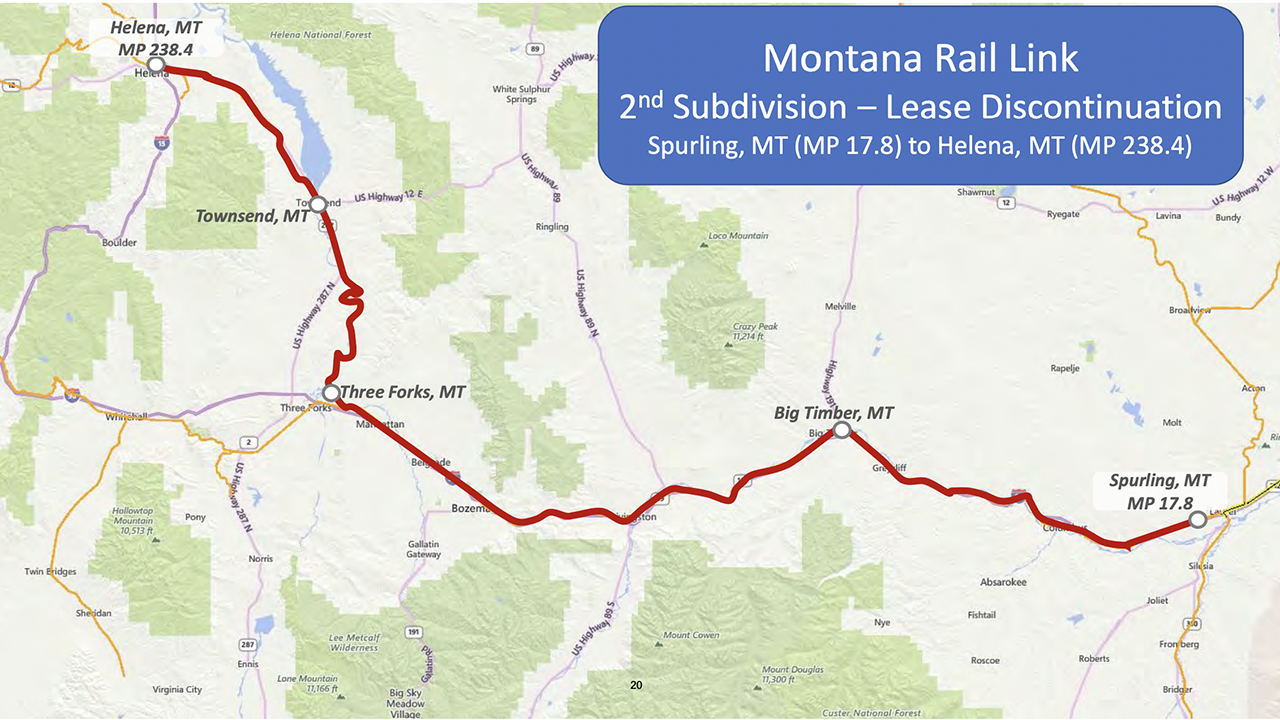Montana
Related: About this forumNTSB Issues MRL Derailment Preliminary Report
NTSB Issues MRL Derailment Preliminary Report
Written by Marybeth Luczak, Executive Editor

View of the accident scene, courtesy of NTSB.
The National Transportation Safety Board (NTSB) has released a preliminary report for its investigation of the performance of DOT-111 tank cars in a Montana Rail Link (MRL) train that was involved in a derailment and bridge collapse on June 24, 2023.
“On June 24, 2023, about 6:14 a.m. local time, Montana Rail Link (MRL) freight train MLEUMIS123, a 55-railcar key train, derailed near Reed Point, Stillwater County, Montana,” according to the report, which NTSB issued July 24 and said contains information that is preliminary and subject to change. “The train was crossing the MRL 51 bridge over the Yellowstone River at a speed of 38 mph when 16 tank cars derailed at milepost 51.6. Sixteen railcars in positions 36 through 52, 15 of which were loaded with hazardous materials (hazmat), derailed. Ten derailed railcars submerged in the water, nine of which were hazmat tank cars. No fire, injuries or evacuations were reported. Visibility conditions at the time of the derailment were daylight and clear; the temperature was 53°F. There was no precipitation, and the wind was out of the north-northwest at 17 mph. Three local water treatment facilities downstream of the derailment were shut down, but emergency protective measures were lifted by noon of that day.”
The report said the 3,280-foot-long train originated from Laurel, Mont., and was destined for Missoula, Mont. Of its 55 cars, 47 were loaded and 35 contained hazardous materials. The track speed limit was 45 mph on the approach to the bridge, then reduced to 40 mph on the curve. ... According to the NTSB report, although the train “did not meet the definition of a high-hazard flammable train as defined in Title 49 Code of Federal Regulations (CFR) 171.8, it met the April 1, 2020, edition of United States Hazardous Materials Instructions for Rail, definition of a key train by having 20 or more loaded hazardous materials shipments or intermodal portable tank loads having any combination of hazardous material and was listed on the train’s consist as such. This train was subject to the safety and security planning requirements of 49 CFR Part 172, Subpart I.”
All the submerged hazmat tank cars were U.S. Department of Transportation (DOT) specification 111A100W1, reported NTSB, which noted that the 15 derailed hazmat tank cars included three loaded with molten sulfur (NA2488), two with sodium hydrosulfide (UN2922), and six with asphalt petroleum liquid (UN2522). The molten sulfur and asphalt petroleum liquid released into the river, it said. ... NTSB’s on-scene tank car inspections were completed July 11, and the agency said “preliminary findings show that hazmat releases occurred from nine mechanically breached tank cars. The remaining 26 hazardous materials tank cars did not breach. The NTSB’s investigation is ongoing.”
{snip}
MRL completed reconstruction work and resumed traffic over the bridge less than a month after the incident. ... The bridge is owned by BNSF, but MRL has maintained it since 1987, according to the Class I railroad. MRL began leasing BNSF lines between Huntley, Mont., and Sandpoint, Idaho, at that time and will continue to do so until the lease concludes in January 2024. BNSF will then resume operational control and infrastructure maintenance, the Class I told Railway Age on June 26. ... “The railroad bridge is inspected twice a year and the most recent inspection was performed in May, [MRL spokesperson Andy] Garland said,” according to a June 26 Associated Press report.
Safety Performance of DOT-111 Tank Cars
Reports: MRL Reopens Railroad Bridge 28 Days After Collapse
Written by Marybeth Luczak, Executive Editor

(Screen Grab of image from KTVQ of Billings, Mont., report on July 23.)
Montana Rail Link (MRL) has resumed traffic over the Twin Rivers Railroad bridge in Stillwater County, Mont., which on June 24 collapsed, sending one of the regional’s trains, hauling hot asphalt and molten sulfur, into the Yellowstone River below. MRL took the lead on cleanup efforts and the Federal Railroad Administration (FRA) is heading an investigation into the incident.

A bridge over the Yellowstone River near Columbus, Mont., collapsed June 24. A Montana Rail Link train crossing it was sent into the water below. (Photograph Courtesy of Sen. Steve Daines, R-Mont., via Facebook)
The train crew was safe and no injuries were reported due to the incident, which took place near Columbus, some 40 miles west of Billings. A total of 17 cars derailed, with 10 cars entering the river. The 17 affected railcars contained sodium hydrosulfide, asphalt liquified petroleum, molten sulfur and scrap metal. The 10 cars that impacted the river contain asphalt liquified petroleum, molten sulfur and scrap metal.
“The Environmental Protection Agency previously estimated up to 250 tons (227 metric tonnes) of oil product entered the river from six asphalt binder tank cars,” according to a July 21 Associated Press report. “Agency spokesperson Beth Archer said Friday [July 21] that officials still were determining a final figure.”
MRL crews began initial work on bridge construction July 4. MRL spokesman Andy Garland told KTVQ of Billings, Mont., that the first train crossed the newly constructed bridge on July 22. ... “Montana Rail Link has resumed operations with the completion of bridge construction efforts at the site of the June 24th derailment near Reed Point,” Garland said in a statement to the news outlet. “Significant progress was made over the last week of construction. Construction work was completed ahead of initial estimates, allowing service to officially be restored 28 days post outage. As normal train traffic resumes, crews and contractors will remain on site to remove all equipment and material utilized throughout the process and continuing to restore the area. The safety of these crews, our employees, and members of the public remains our top priority as train service is restored.”

The collapsed bridge is located near Columbus, Mont., northeast of Absarokee (see above) and some 40 miles west of Billings. (Map Courtesy of MRL, via Nov. 18, 2022 STB Filing)
{snip}
2naSalit
(99,384 posts)My buddy and I decided to drive over there and look at it. The trains are starting to run again so we had to go look, it's a little over an hour downriver. There were a lot of trains waiting to go east along the way east of Livingston where we met up with the rails. The last time I saw that many heavy cranes in one place was a shipyard. From the looks of the staging locations along the road they were working 24/7 on that. It's a major rail route and things have been stacked up all this time. Much of the priority freight ran up on the "highline" route in northern Montana but there was a derailment up by Havre Sunday, I think, so that has put a lot of stress on the network and the southern route in particular. I bet some rerouting from the west coast is running south of Montana. it's kind of like when that freighter got stuck in the Suez Canal.